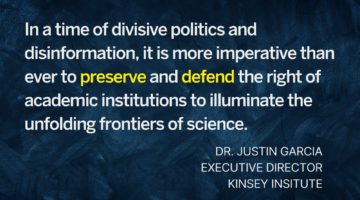Can Abstaining From Masturbation Increase Testosterone?
January 24, 2020 by Justin Lehmiller
“Across the alt-right movement, leaders are telling young men not to masturbate, “ says clinical psychologist Dr. David Ley in a recent interview. Why is that? In part, because some in the alt-right believe that stopping masturbation enhances testosterone levels and, consequently, increases one’s sexual desirability.
But is there any truth to this claim? Does abstaining from masturbation really increase testosterone? Let’s take a look at what the research says.
To support their argument, those in the alt-right are probably pointing to a 2001 study. In it, ten male participants had their testosterone levels assessed at baseline and then again after a 3-week abstinence period during which they were asked to refrain from “any type of sexual activity” [1]. After that 3-week period, participants masturbated to orgasm in a lab and had their testosterone levels measured before and afterwards.
While masturbation itself was not linked to any changes in testosterone levels in this study, the 3-week abstinence period was found to increase testosterone levels overall. In other words, masturbation didn’t seem to affect testosterone, but abstinence did.
Consistent with these findings, another study of ten men that looked only at testosterone levels pre- and post-masturbation found no effect on hormone levels [2], while another study of 28 men found that abstinence increased testosterone, but only after a 7-day period [3].
Contrary to these results, however, a study of 34 men who had their testosterone levels assessed both before and after masturbation found that testosterone levels were actually higher after self-stimulation [4].
This latter finding is consistent with the broader scientific literature looking at how sexual activity is linked to changes in testosterone. As reported in a review paper on this subject [5]:
- 4 out of 5 studies looking at the the effect of watching erotic movies on testosterone found that men’s testosterone increased afterwards.
- 2 out of 5 studies looking at the effect of penile-vaginal intercourse on testosterone found that men’s testosterone increased afterwards (although it’s worth pointing out that one of the studies that found no effect had just one participant, so it’s probably not reliable and shouldn’t even be counted here).
- 1 study looking at the effect of sex with unfamiliar or multiple partners on testosterone found that testosterone increased after these situations..
In other words, while there is indeed some research finding that sexual abstinence is linked to higher testosterone in men, the evidence is—at best—very mixed. Also, if you look to the overall trend in the data, it actually suggests that being sexually active in general increases testosterone, with the most consistent finding being that looking at porn enhances T.
That said, it’s important to note that all of these studies are based on very small samples. Sample sizes for the 15 studies reviewed above ranged from just 1 to a maximum of 34, which means we need to be very cautious about drawing firm conclusions, especially from any single study. It’s very easy for studies based on small samples to yield spurious findings, which is why replication is so important.
Clearly, this is an area where replication with large and diverse samples would be especially useful. For example, it would be worth exploring whether similar effects occur across persons of different genders and sexualities, and also across different sexual activities.
I should mention that there are a handful of studies that have looked at testosterone changes in women: as reported in the aforementioned review paper, 2 out of 3 studies involving women found that sexual activity was linked to an increase in testosterone [5]. However, these three studies combined involved just 19 participants, so we need to take these findings with a grain of salt.
The main takeaway from this (aside from the fact that we obviously need more data!) is that it’s probably not wise to give blanket advice about how abstaining from masturbation boosts hormone levels. The data are just not clear enough to make such a recommendation and, in fact, there’s actually more evidence that sexual activity (and exposure to porn in particular) increases testosterone.
Want to learn more about Sex and Psychology? Click here for previous articles or follow the blog on Facebook (facebook.com/psychologyofsex), Twitter (@JustinLehmiller), or Reddit (reddit.com/r/psychologyofsex) to receive updates. You can also follow Dr. Lehmiller on YouTube and Instagram.
[1] Exton, M. S., KruÈger, T. H., Bursch, N., Haake, P., Knapp, W., Schedlowski, M., & Hartmann, U. (2001). Endocrine response to masturbation-induced orgasm in healthy men following a 3-week sexual abstinence. World Journal of Urology, 19(5), 377-382.
[2] Krüger, T., Exton, M. S., Pawlak, C., von zur Mühlen, A., Hartmann, U., & Schedlowski, M. (1998). Neuroendocrine and cardiovascular response to sexual arousal and orgasm in men. Psychoneuroendocrinology, 23(4), 401-411.
[3] Jiang, M., Jiang, X., Zou, Q., & Shen, J. W. (2003). A research on the relationship between ejaculation and serum testosterone level in men. Journal of Zhejiang University-SCIENCE A, 4(2), 236-240.
[4] Purvis, K., Landgren, B. M., Cekan, Z., & Diczfalusy, E. (1976). Endocrine effects of masturbation in men. Journal of Endocrinology, 70(3), 439-444.
[5] Van Anders, S. M., & Watson, N. V. (2006). Social neuroendocrinology. Human nature, 17(2), 212-237.
Image Source: 123RF/Anton Estrada
You Might Also Like:

Dr. Justin Lehmiller
Founder & Owner of Sex and PsychologyDr. Justin Lehmiller is a social psychologist and Research Fellow at The Kinsey Institute. He runs the Sex and Psychology blog and podcast and is author of the popular book Tell Me What You Want. Dr. Lehmiller is an award-winning educator, and a prolific researcher who has published more than 50 academic works.
Read full bio >


